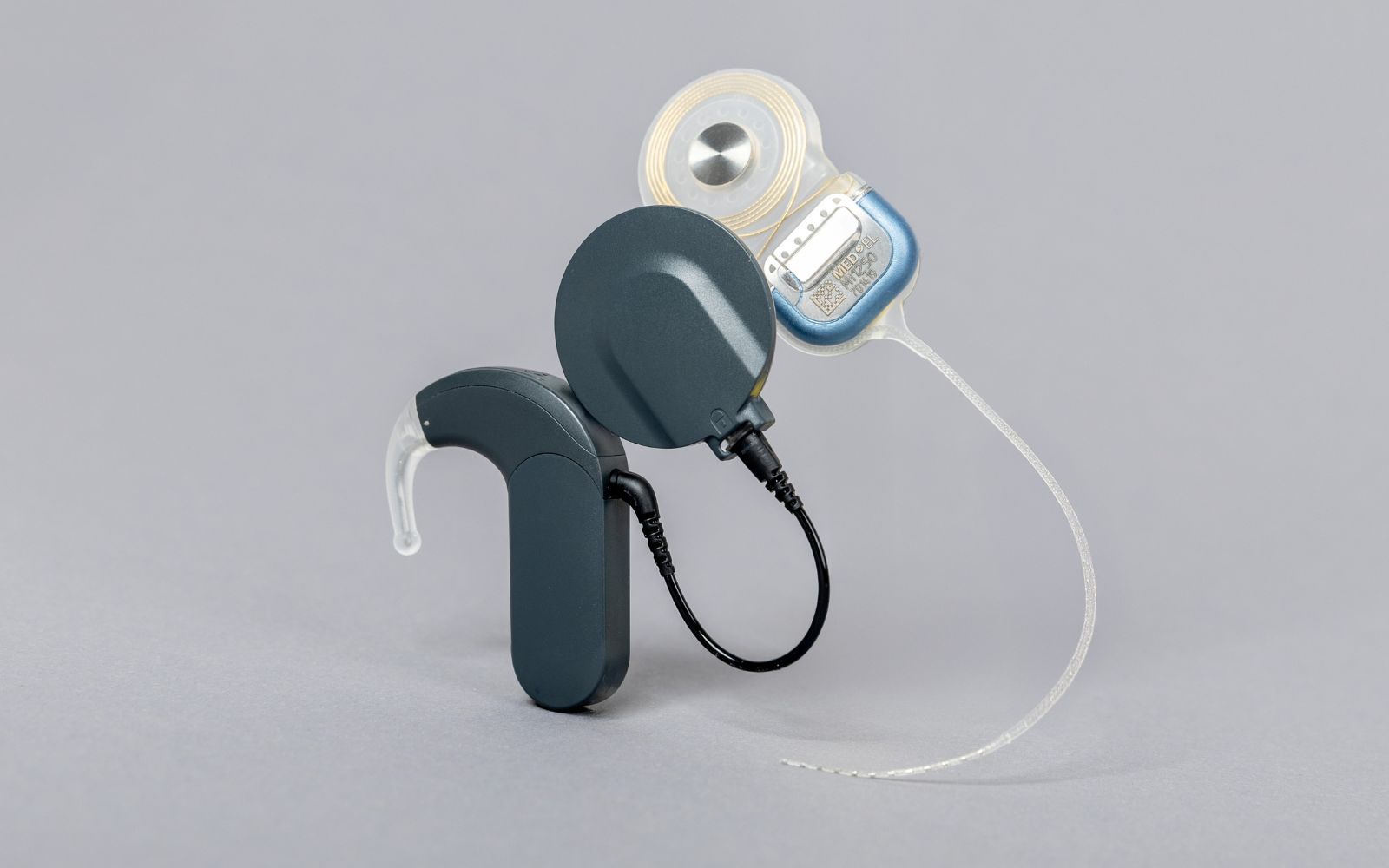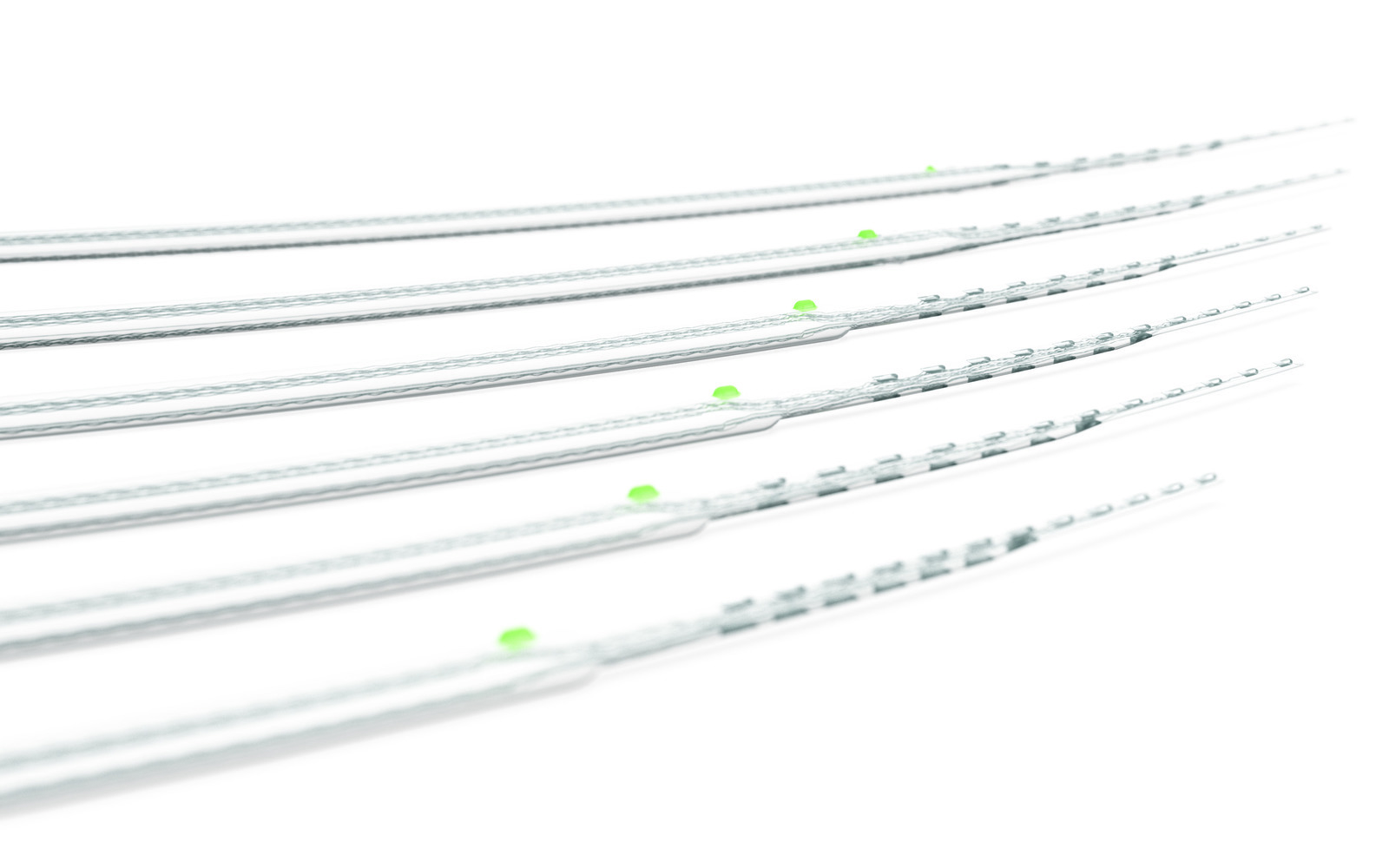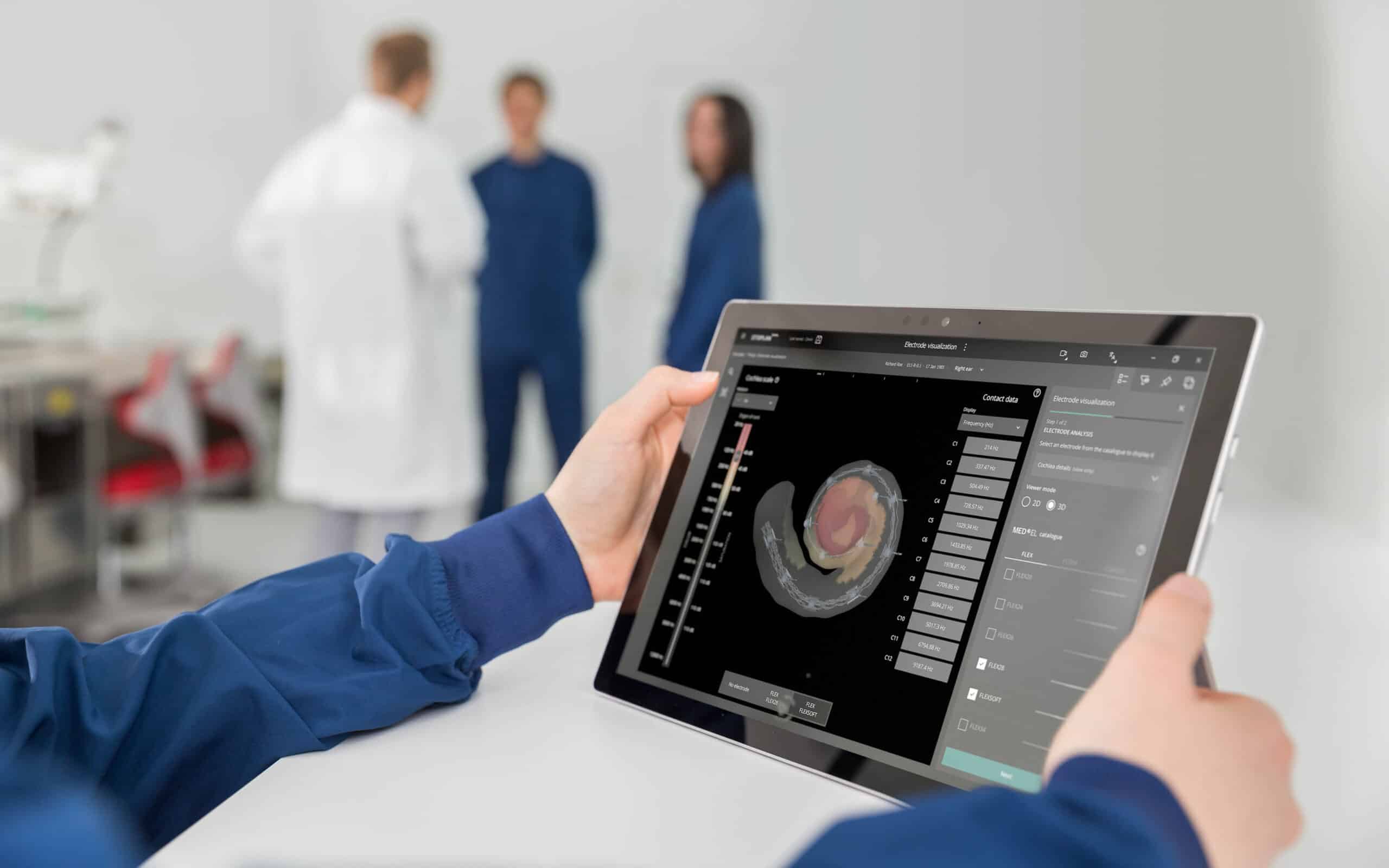
MED-EL
Published Nov 01, 2023 | Last Update Jan 22, 2025
What Is an Individualized Cochlear Implant?
The best shoes are the ones that fit your feet. And the best cochlear implant is the one that fits your ear! As the name suggests, an individualized cochlear implant is designed to fit your individual cochlea. Why is this important? Because it means you can have your best hearing.

When we say individualized cochlear implant, we’re talking about a specific part of the implant: the electrode array. The electrode array is the wire at the end, which is inserted into your cochlea—inner ear—during surgery. The electrode contacts along this wire stimulate the nerve cells in your cochlea, sending sound signals to your brain that allow you to hear.

The SONNET 3 behind-the-ear audio processor is worn externally, and the implant with the electrode array is implanted and hidden completely under the skin.
How long should your electrode array be? Higher frequencies are stimulated at the base or entrance of the cochlea, and lower pitches are stimulated further along the cochlea toward the apex.
To ensure that you can hear a full spectrum of sound, your cochlear implant’s electrode array should be long enough to cover your entire cochlea. If the electrode array is too short, you might not hear lower bass tones, causing things to sound unnatural and making it hard to hear properly.

The highest frequencies are stimulated in the part of the cochlea shown in purple, and the lowest frequencies are stimulated in the part of the cochlea shown in red.
Electrode Array Lengths
But cochleae come in many shapes and sizes. You’re more likely to have the same size feet as somebody else than the same size cochlea. When you go to the shoe store, there is a range of different sizes available so you can choose the ones that fit your feet. It doesn’t make sense to have shoes that are “one size fits all.”

And it also doesn’t make sense to have “one-size-fits-all” cochlear implants. MED-EL offers a wide variety of cochlear implant arrays in a range of different lengths so your surgeon can choose the one that best fits your unique cochlea.
How do they do that? First they have to measure your cochlea. That’s easy with OTOPLAN software. Using the exact measurements provided by OTOPLAN, your surgeon can quickly see which electrode array is right for your individual cochlea.

Flexible Electrode Arrays
MED-EL’s FLEX series of electrode arrays are designed to preserve the delicate structures in your inner ear. These arrays gently bend to adapt to the unique shape of your cochlea. They contain wave-shaped wires that bend more easily than straight wires. And the electrodes in the array are spaced optimally to make the array more flexible. Optimal spacing can also prevent electrodes from stimulating overlapping parts of the cochlea.
Solutions for Difficult Anatomies
Other factors besides length and flexibility can be important for some CI candidates. Many people with hearing loss have malformed or ossified cochleae, and a regular electrode array may not be the best fit. But MED-EL has designed electrode arrays that can work for you even if your cochlea is like this.
If your cochlea is malformed and doesn’t have much space for an implant, your surgeon could go for a shorter compressed electrode array. Or if there is a risk of cerebrospinal fluid leakage, they could choose a FORM electrode array. And those are just a few of the many options manufactured by MED-EL. Your surgeon might even bring several electrode arrays to the surgery. That’s how Mary Beth’s surgeon chose the right implant for her.
Activation and Pitch-Perfect Fitting
The next steps after surgery are activation and fitting with your audiologist. Activation is when your audio processor is turned on for the first time and you can hear with your new individualized cochlear implant from MED-EL. Your audiologist will be able to “fit” your CI—a bit like “tuning” each electrode—to individualize your cochlear implant and optimize your hearing even further.
Want to know which individualized cochlear implant is right for you? Contact your nearest clinic for more information about individualized cochlear implants.
And meet the man behind MED-EL’s electrodes in this exclusive interview with Claude Jolly.
You can also find out more about how cochlear implants work and how they could help you or your child on our website.
References

MED-EL
Was this article helpful?
Thanks for your feedback.
Sign up for newsletter below for more.
Thanks for your feedback.
Please leave your message below.
Thanks for your message. We will reply as soon as possible.
Send us a message
Field is required
John Doe
Field is required
name@mail.com
Field is required
What do you think?
© MED-EL Medical Electronics. All rights reserved. The content on this website is for general informational purposes only and should not be taken as medical advice. Contact your doctor or hearing specialist to learn what type of hearing solution suits your specific needs. Not all products, features, or indications are approved in all countries.
Peter Weinstein
November 01, 2023
I am scheduled for cochlear implant with med el device 11/17… I need help pairing my sonnet with my iPhone…. Waiting to hear from Lauren
MED-EL
November 06, 2023
Hello Peter, thank you for your comment. Lauren and the team will reach out to you today for assistance. All our best wishes for your hearing journey! Kind Regards, Giulia
Jorge
April 12, 2024
En Argentina donde están?
MED-EL
April 15, 2024
Hi Jorge, thanks for reaching out. We have forwarded your contact information to your local MED-EL team in Argentina and they will get in touch with you directly for further assistance. Please let us know if you have any further questions. Kind regards, Gordana
Николай Големанов
September 28, 2024
Hi, dear colleagues! I am a medical doctor, 91 y. o. After a severe neuritis of my right vestibulocochlear nerve in 1980, I completely lost ability to hear with the right ear. About five years ago hearing problems started to appear on the left side, slowly worsening in time. I lost already about 20 percent of high frequencies, I badly hear symphonic orchestra, even from recordings of perfect quality, I do not understand what people talk of, especially in noisy conditions. I have used an external hearing aid apparatus PHONAK AUDEO P-30-RT for two years with unsatisfactory results. My question is: Is there any hope to improve my hearing by cochlear implant? Thanks for your time! N. Golemanov Sofia, Bulgaria, Europe
MED-EL
September 30, 2024
Hi Nikolay, thank you for your comment and for sharing your experience. If you wish to see whether you might be a candidate for a cochlear implant, we suggest talking directly with your medical professional or local MED-EL team. They can assess your case, determine your candidacy and walk you through options. For Bulgaria, you can submit your request via: https://www.medel.com/contact-med-el or write an email directly to office@at.medel.com. Kind Regards, Giulia
Munsch
January 22, 2025
Bonjour , j'ai depuis quelques années des appareils auditifs signia ,ensuite Hansaton . Actuellement je suis en test avec d'autres appareils qui ne me satisfont pas , car l'écoute en milieu familial est tres dur même avec les nouvelles technologies IA Lors de mon dernier examen ORL (chirurgien de l'oreille moyenne) , il apparait une perte d'audition sur le tonale 53 et 45db et sur l'audiométrie vocale avec un seuil intelligibilité de 98% non atteinte à droite à+100db et 100% non obtenu à gauche Je dois voir prochainement un centre CHU de Nancy (54) pour une étude d'un implant cochléaire. j'aimerai votre avis concernant vos produits sur mon audition Lieu : France / Moselle (57) Cordialement
MED-EL
January 23, 2025
Hi Marc, thank you for your comment. We recommend getting in touch with your local MED-EL team in France directly as they are best equipped to give you information on our hearing solutions. We have forwarded your request as well as your e-mail to them and they will get in touch with you directly for further assistance. Kind regards, Gordana
Mirtha Roca vaca
January 22, 2025
Hola les escribo para ver si tengo alguna solución de podría obtener un aparato poder escuchar seme a perdido el q tenia aver como puedo conseguir ..otro
MED-EL
January 23, 2025
Hi Mirtha, thank you for reaching out. We recommend getting in touch with your local MED-EL team as they are best equipped to find a solution for you. Please contact them directly via https://www.medel.com/es-es/contact-med-el Kind regards, Gordana
Felicien MoyiKwambanga
January 23, 2025
Hi 👋 I would to thank for the implementation the new technology to help people. But ,I have Samba2 divise. It is very easy for samba2 external part to fall on the floor and risk of damaging can you thing about the solution?
MED-EL
January 23, 2025
Hi Felicien, thank you for reaching out. We recommend getting in touch with your local MED-EL team and audiologist to adjust your SAMBA 2's magnet strength according to your needs. Please get in touch with them directly via https://www.medel.com/contact-med-el for further assistance. Kind regards, Gordana
Zetlmeisl Cordula
January 23, 2025
senden Sie mir bitte diese Mitteilungen in deutscher Sprache
MED-EL
January 23, 2025
Liebe Cordula, vielen Dank für Ihr Kommentar. Sie finden unsere Blogartikel auf deutsch hier: https://blog.medel.com/de/ Zu dem Artikel zum Thema "Individualisierte CI" kommen Sie hier: https://blog.medel.com/de/technologie/zukunftsperspektive-individualisiertes-ci/ Liebe Grüße, Gordana
Divyansh
January 25, 2025
Sir ji I have a CI Rondo 2 but it is not water proof, what should I do to protect it from water and my battery is getting discharged very quickly, where can I buy original battery from
MED-EL
January 27, 2025
Hi , thanks for contacting us. To fully protect your RONDO 2 from water, you can use the WaterWear waterproof cover, you can find more information about it here: https://www.medel.com/hearing-solutions/cochlear-implants/rondo2#Water-resistance. For purchasing any product, such as WaterWear or batteries, please get in touch with your local MED-EL team directly via this form: https://www.medel.com/contact-med-el. Kind Regards, Giulia
Jenneke Steenbrink
February 02, 2025
Hello, I have get my CI in april 1996 so already almost 30 years. How long will it be ok? 1 electrode is not working any more . Now I have just 7 more. Kind regards from Jenneke operated in Utrecht The Netherlands.
MED-EL
February 03, 2025
Hi Jenneke, thank you for contacting us. We recommend getting in touch with your local MED-EL team in the Nederlands, as they can assess your individual case and advise you on the next possible steps. You can contact them via this form: https://www.medel.com/nl/contact-med-el. Or via the following contact details: MED-EL Care Center Utrecht Parijsboulevard 209, 3541 CS Utrecht Telefoon: 085 76 00 167 E-mail: cc-utrecht@medel.com Kind Regards, Giulia

MED-EL

MED-EL
.png)



Conversation
9 Comments